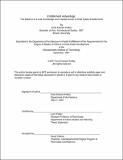Entitlement advantage : the balance of local knowledge and capital access in real estate entitlements
Author(s)
Kelley, Scott Edward
DownloadFull printable version (353.9Kb)
Alternative title
Balance of local knowledge and capital access in real estate entitlements
Other Contributors
Massachusetts Institute of Technology. Dept. of Architecture.
Advisor
Lynn Fisher.
Terms of use
Metadata
Show full item recordAbstract
Development is risky. The process of getting a shovel in the ground, steel into the sky, and rent checks into the bank involves distinct phases, each with their own risk and return profile. Generally considered the most risky, the entitlement phase is process by which the development entity gains the legal right to parcel land and develop a prescribed structure. This process sits at the confluence of all development factors: local politics, due diligence, financial support, and patience. The purpose of this paper is to identify the critical organizational structures and human capital required to reduce entitlement risk. It begins with an overview of the definition of entitlement risk by generating a connection between financial projections and the idiosyncratic entitlement process. Risk in the entitlement stage is a function of control. The entitlement process has become increasingly complex in the last few decades with landowners and developer faced with diminished control over land destiny. The study follows with a review of reported best practices enlisted by developers to alleviate the risks in the entitlement process. A paradox exists in real estate entitlements where the local player is advantaged by local information and connections, but may lack capital while the national player is advantaged by capital access, but may need local information and connections. The existence of this paradox would suggest that national firms engaged in entitlements would adopt organizations and strategies to help alleviate their weaknesses. Indeed, this is the case, as evidenced by the five subject firms whose organization, strategy, partnering, geographic focus, and returns are discussed and compared. Ultimately, firm structures of national players not only succeed in diminishing the advantage of the local player, but do so in a fashion that brings exceptional returns that meet the stringent expectations of their varied investors.
Description
Thesis (S.M. in Real Estate Development)--Massachusetts Institute of Technology, Dept. of Architecture, 2007. This electronic version was submitted by the student author. The certified thesis is available in the Institute Archives and Special Collections. Includes bibliographical references (leaves 70-73).
Date issued
2007Department
Massachusetts Institute of Technology. Department of ArchitecturePublisher
Massachusetts Institute of Technology
Keywords
Architecture.